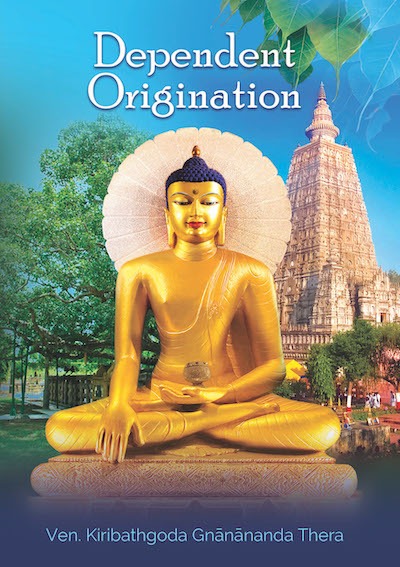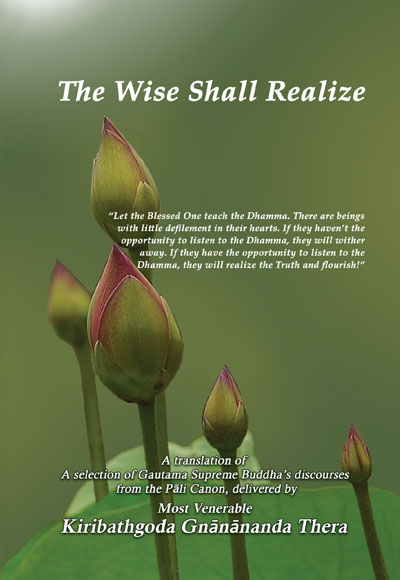From this book you will learn about the lives and enlightenment of monks who followed the Buddha’s path to the final end. This is a complete translation of the Theragatha found in the Sutta Pitaka.
While you are reading this noble text, Venerable Arahants might seem to appear in front of you. You may get the feeling they are speaking with you. You will witness before you the display of the ultimate purity of their hearts.
It is amazing to witness how respectfully they memorized and practiced those pure words of the Buddha. We will be able to clearly understand the nature of the true disciples of the Buddha through these verses of Arahant monks.
These verses are like a wondrous mirror that aids us in understanding the pure lives of the noble disciples of the Buddha to whom we go for refuge by saying “Saṅghaṁ Saranaṁ Gacchāmi.”

In Sri Lanka
All of these books are available at the book shops in our monasteries and our online store Mahamegha.store
In Colombo they are available at the Tripitaka Sadaham Poth Medura in the YMBA building on Austin Place. Phone 01 14 255 987.
The Arahant
It is sweet even to hear the sound of the word “Arahant.” To be able to meet a venerable Arahant monk or nun is an extremely fortunate event. In this human world, living among the humans, walking on this earth, these Arahants belong to a group of marvelous humans.
Arahants Cannot Be Measured
In this universe, these magnificent beings only appear with the help of a fully enlightened Buddha. This is because it is only under the instruction of the Buddha that the Noble Eight-Fold Path which leads to the attainment of the fruit of Stream-entry, Once-returning, Non-returning, and Arahantship is revealed. Therefore it is impossible to measure these Arahants who have achieved the ultimate purity, having destroyed all defilements.
“Monk Upasīva, there is no way to measure an Arahant who has achieved ultimate freedom, Nibbāna. If someone uses an ordinary unit of measurement to measure ordinary people, Arahants cannot be measured in this way. Once all defilements have been eradicated, all arguments cease.”
Upasīva Sutta, Sutta Nipāta verse 1076
Like Golden Swans
For an ordinary person, it is impossible to comprehend the life of Arahants. An Arahant’s life is unimaginably peaceful, simple, and liberated. In this world the only person that walks with perfect freedom is an Arahant. In this time period the very first person to become an Arahant was the fully enlightened Buddha. The Buddha spoke about the lives of Arahants in this way:
“Arahants are well established in the Four Establishments of Mindfulness. They are not bound by craving. Like the swans that fly away from the lake, they let go of everything, large and small.”
Dhammapada, verse 91
The Tamed Arahant
If the six sense bases are completely tamed in someone, that person is definitely an Arahant. The tameness that arises from virtue, concentration, and wisdom is mind-blowing. This is the exact reason that they are extremely humble.
“Arahants tame their senses with the same skill that an expert horse tamer tames his horses. Because of this they become utterly extinguished. Humble and with unshakeable minds, these unblemished Arahants are a pleasant sight, even for the gods.”
Dhammapada, verse 94
Beautiful Is the Place They Reside
The Arahant sages who do wholesome actions, who speak wholesome words, and who think wholesome thoughts, make even the environment around them become beautiful. The liberated personality of these Arahant monks and nuns matches the beauty of nature very well. Like the beauty of a flower, they possess an untarnished, inherent beauty.
“Whether it be a village, a jungle, a valley, a hill or any other place, if Arahants dwell there, that place is truly delightful.”
Dhammapada, verse 98
Glowing with Wisdom
Possessing an enchanting wisdom, our Great Teacher, the Buddha, shared his knowledge with his disciples. Those disciples used the power of the Buddha’s enchanting wisdom to stimulate their own wisdom. It was because of that power of wisdom that they were able to rise above the ordinary people. The Buddha explained that point in this way:
“A beautiful, fragrant lotus blooms in a mud-hole filled with filth along the highway road. In the same way, in the world with its ignorant, worldly people that have stained and impure beliefs, a disciple of the Buddha will stand out among them, shining with brilliant wisdom.”
Dhammapada, verses 58 & 59
The Realization of an Arahant
One becomes an Arahant by realizing the Four Noble Truths fully. That realization must occur in three phases and twelve modes. The Blessed One explained this fact in his very first discourse—the Dhammacakkappavattana Sutta.
When one becomes a stream enterer, that disciple attains the first phase with regard to the Four Noble Truths. It is known as “the knowledge of the truth.”
The Knowledge of the Truth
The one who attained the Knowledge of the Truth embraces the first factor of the Noble Eight-fold Path. This means he has within himself the right view that comes from the understanding of the Four Noble Truths. He knows by his own understanding: suffering as a noble truth, the cause of suffering as a noble truth, the end of suffering as a noble truth, and that the path that must be followed to end suffering is the Noble Eight-fold Path as a noble truth. This is the Knowledge of the Truth.
The Knowledge of the Task to Be Accomplished
This is the second phase. In the first phase, the disciple understood the knowledge of the truth with regards to the Four Noble Truths. In this second phase, the disciple should have the knowledge of the task to be accomplished with regard to each noble truth. He understands that the noble truth of suffering is to be fully understood, the noble truth of the cause of suffering is to be abandoned, the noble truth of the end of suffering is to be realized, and the way leading to the end of suffering is to be developed in terms of virtue, concentration, and wisdom. This way the disciple of the Buddha realizes the Four Noble Truths completely, having established on the knowledge of the Four Noble Truths itself.
The Knowledge That the Task Has Been Completed
In this way, when one has started to develop the Noble Eightfold Path, he is capable of developing the thirty-seven aids to enlightenment. Within it, the three-fold way of training called virtue, concentration, and wisdom is developed. Then, he becomes liberated from all defilements and becomes enlightened. Having completed the task with regard to the Four Noble Truths he possesses the Knowledge That the Task Has Been Completed.
This means he has the knowledge that what had to be done with regard to the Noble Truth of Suffering has been completed. That is, the complete understanding of the Noble Truth of Suffering. He has the knowledge that what had to be done with regard to the Noble Truth of the Cause of Suffering has been completed. That is, the complete eradication of the Noble truth of the Cause of Suffering. He has the knowledge that what had to be done with regard to the Noble Truth of the End of Suffering has been completed. That is, the achievement of the Noble Truth of the End of Suffering. He has the knowledge that what had to be done with regard to the Noble Truth of the way leading to the End of Suffering has been completed in terms of virtue, concentration, and wisdom. That is, the development of the Noble Truth of the way leading to the End of Suffering. This is the third phase.
In this way, we have passed through an era where thousands of Arahants lived with the all-encompassing knowledge of the Four Noble Truths.
Inspired Utterances of Arahants
There are accounts mentioned in the Dhamma that those Arahants uttered inspired utterances about this amazing transformation which took place in their lives:
“Birth is destroyed. The holy life has been lived. What had to be done to attain enlightenment has been done. There is nothing more to be done to attain enlightenment.”
The Era of a Buddha
The era of a Buddha occurs extremely rarely in the world. During that time, the chance to be born human and to come across the teaching of the Buddha is known as a time of momentous fortune. This moment in a human life is an extremely rare occurrence. Arahants are the only ones that make maximum use of this fruitful moment.
Each discourse of the Buddha contains teachings that solely lead to Arahantship in this very life. There aren’t any other hidden meanings within it. Wise people are skillful in understanding that fact. With that knowledge, they place confidence in the Buddha. Furthermore, they strongly believe in the ultimate solution presented by the Buddha. They give the highest priority to realizing it. They abandon the home life and go forth into homelessness and become monks and nuns.
The Buddha’s Path
The Buddha’s path is a name given for the way leading to Nibbāna, preached by the Buddha.
Sabba pāpassa akaraṇaṁ
Kusalassa upasampadā
Sacitta pariyodapanaṁ
Etaṁ Buddhāna sāsanaṁ
“To abstain from all evil, to cultivate the thirty-seven aids to enlightenment, and to cleanse your own mind, this is the teaching of all Buddhas.”
Dhammapada, verse 183
Entering the Buddha’s Path
Entering the Buddha’s path means that you embrace the Three Refuges and receive the full ordination. After that, one is gradually tamed, all the way up to Arahantship. It is because of this that Arahants utter the inspired utterance saying “Kataṁ buddhassa sāsanaṁ” (the Buddha’s path has been fully followed).
The Buddha had this unsurpassed, extraordinary ability to guide the disciples who enter the path until Arahantship is reached. There is an occasion in the Middle Length Discourses where the Buddha explains the instructions on taming his disciples to a brāhmin named Gaṅaka Moggallāna in the Gaṅaka Moggallāna Sutta (Majjhima Nikāya 107).
Instructions from the Buddha
“Just as, brāhmin, when a clever horse-trainer obtains a fine thoroughbred horse, he first makes him get used to wearing the bit, and afterwards trains him further, so too when a person comes to the Tathāgata to be tamed, he first disciplines him thus: ‘Come monk, be virtuous, restrained with the restraint of the major code of discipline, possess courteous behavior and good conduct, and seeing fear in the slightest fault, train in the precepts you have undertaken.’
Guard Your Sense Faculties
“When, brāhmin, the monk is virtuous… and seeing fear in the slightest fault, trains in the precepts he has undertaken, then the Tathāgata disciplines him further: ‘Come, monk, guard the doors of your sense faculties. On seeing a form with the eye, do not grasp at its signs and features. Since, if you were to leave the eye faculty unguarded, evil unwholesome states of desire and anger might invade you, therefore practice the way of its restraint, guard the eye faculty, undertake the restraint of the eye faculty. On hearing a sound with the ear… On smelling an odour with the nose… On tasting a flavour with the tongue… On touching a tangible with the body… On cognizing a mind-object with the mind, do not grasp at its signs and features. Since, if you were to leave the mind faculty unguarded, evil unwholesome states of desire and anger might invade you, therefore practice the way of its restraint, guard the mind faculty, and practice the restraint of the mind faculty.’
Take Meals with Full Awareness
“When, brāhmin, the monk guards the doors of his sense faculties, then the Tathāgata disciplines him further: ‘Come, monk, be moderate in eating. Reflecting wisely, you should take food, neither for fun nor for intoxication nor for the sake of physical beauty and attractiveness, but only for the endurance and continuance of this body, for ending painful feelings, and for assisting the holy life, considering: “Thus I shall give up old feelings without making new feelings and I shall be healthy and blameless and shall live in comfort.’
Meditating with Wakefulness
“When, brāhmin, the monk is moderate in eating, then the Tathāgata disciplines him further: ‘Come, monk, be devoted to meditation with wakefulness. During the day, while walking back and forth and sitting, clean your mind of states that block it. In the first part of the night, while walking back and forth and sitting, clean your mind of states that block it. In the middle part of the night you should lie down on the right side in the lion’s pose with one foot overlapping the other, mindful and fully aware, after noting in your mind the time for wakening up. After rising in the morning, in the third part of the night, while walking back and forth and sitting, clean your mind of states that block it.’
Be Mindful of Your Body Position and Daily Routines
“When, brāhmin, the monk is devoted to wakefulness, then the Tathāgata disciplines him further: ‘Come, monk, be possessed of mindfulness and full attentiveness. Act in full awareness when going forward and returning; act in full awareness when looking ahead and looking away; act in full awareness when flexing and stretching your limbs; act in full awareness when wearing your robes and carrying your double robe and bowl; act in full awareness when eating, drinking, consuming food, and tasting; act in full awareness when defecating and urinating; act in full awareness when walking, standing, sitting, falling asleep, waking up, talking, and keeping silent.’ (This means that one should not allow unwholesome states to arise)
Live in Seclusion
“When, brāhmin, the monk possesses mindfulness and full awareness, then the Tathāgata disciplines him further: ‘Come, monk, spend time in a secluded resting place: the forest, the root of a tree, a mountain, a ravine, a hillside cave, a charnel ground, a jungle thicket, an open space or a heap of straw.’
Give Up the Five Hindrances
“He resorts to a secluded resting place: the forest… a heap of straw. On returning from his alms round, after his meal he sits down, folding his legs crosswise, setting his body straight, and establishing mindfulness on the meditation object. Giving up greed for the world, he lives with a mind free from greed; he purifies his mind from greed. Giving up ill will and hatred, he lives with a mind free from ill will, compassionate for the wellbeing of all living beings; he cleans his mind of ill will and hatred. Giving up sleepiness and drowsiness, he lives free from sleepiness and drowsiness, able to perceive light, mindful and fully aware; he purifies his mind from sleepiness and drowsiness. Giving up restlessness and remorse, he lives without an agitated mind and is peaceful inside; he purifies his mind from restlessness and remorse. Giving up doubt, he lives having gone beyond doubt, without confusion about wholesome states; he purifies his mind from doubt.
Attain Jhānas
“Having thus given up these five hindrances, imperfections of the mind that weaken wisdom, quite secluded from sensual pleasures, secluded from unwholesome states, he enters upon and stays in the first jhāna, which has applied and sustained thought, with rapture and pleasure born of seclusion.
“With the stilling of applied and sustained thought, he enters upon and stays in the second jhāna, which has self-confidence and singleness of mind without applied and sustained thought, with rapture and pleasure born of concentration.
“With the fading away as well of rapture, he lives in equanimity, and mindful and fully aware, still feeling pleasure with the body, he enters upon and stays in the third jhāna, because of which noble ones announce: ‘He has a pleasant abiding who has equanimity and is mindful.’
“With the abandoning of pleasure and pain, and with the previous disappearance of joy and grief, he enters upon and stays in the fourth jhāna, which has neither-pain-nor-pleasure and purity of mindfulness due to equanimity.
“This is my instruction, brāhmin, to those monks who are in the higher training, whose minds have not yet attained the goal of Arahantship, who live hoping to achieve the supreme security from bondage.
“But these things lead to both to a pleasant living here and now and to mindfulness and full awareness for those monks who are arahants with taints destroyed, who have lived the holy life, done what had to be done, laid down the burden of defilements, reached the goal gradually, destroyed the things that tie one to existence, and are completely liberated through final knowledge.”
In this manner, having developed the knowledge of seeing things as they really are, that monk or nun contemplates all formations as impermanent, suffering, and non-self. Through the realization of the Four Noble Truths, he becomes liberated from suffering.
Marvelous Lives
Now you have learned about the incredible gradual training used by the Buddha to discipline his disciples. The Buddha explained about the noble lives of his enlightened disciples who were fully tamed under that instruction in this way:
“Monks, to whatever extent there are dwelling places of beings, even up to the peak of existence, Arahants are the foremost in the world, Arahants are the Supreme.
Paṭama Arahanta Sutta, SN 22.76
Verses of Enlightened Monks
Through this sacred book, you will meet the noble sages who attained enlightenment when the Buddha was alive.
These exalted sages achieved the essence of the Buddha’s path: the liberation through Arahantship and ultimate freedom. The account of their struggle for enlightenment is amazing. It is hard to imagine how they practiced the Dhamma with such extreme energy and determination, even at a risk to their own lives.
Saying “Saṅghaṁ saranaṁ gacchāmi,” we go for refuge to this community of noble disciples. How exalted and pure they are! We who are living in the twenty-sixth century of the Buddhist era can be overjoyed simply by recollecting the pure lives of such enlightened disciples.
While you are reading this sacred book, those Arahant nuns might seem to appear in front of you. You will feel like they are conversing with you. You will witness before you the display of the ultimate purity of their hearts. The community of the Buddha’s noble disciples is absolutely remarkable and magnificent.
Venerable resident monks in the Mahamewnawa Meditation Monastery, members of the Maha Sangha, and faithful devotees supported me in compiling this sacred book. May they achieve the Supreme bliss of Nibbāna!
May our noble friends, Mr. Dayawamsa Jayakodi and Mrs. Jayakodi, and their staff who aided in of the publishing of this sacred book, also achieve Nibbāna! May you who read this book attain Nibbāna in this Gautama Buddha’s path!
Ven. Kiribathgoda Ñānānanda Thero
Mahamewnāwa Meditation Monastery
Vaduwāwa, Yatigaloluwa
Polgahawela
Sri Lanka
Introduction
Recollecting the Exalted Qualities of the Community of Noble Monks
Section of Single Verses
The Verse of Arahant Subhūti
The Verse of Arahant Mahākoṭṭhita
The Verse of Arahant Kaṅkhārevata
The Verse of Arahant Puṇṇa
The Verse of Arahant Dabba
The Verse of Arahant Sītavaniya
The Verse of Arahant Bhalliya
The Verse of Arahant Vīra
The Verse of Arahant Pilindavaccha
The Verse of Arahant Puṇṇamāsa
The Verse of Arahant Cūlavaccha
The Verse of Arahant Mahāvaccha
The Verse of Arahant Vanavaccha
The Verse of Arahant Vanavaccha’s Pupil
The Verse of Arahant Kuṇḍadhāna
The Verse of Arahant Bellaṭṭhisīsa
The Verse of Arahant Dāsaka
The Verse of Arahant Siṅgālapitu
The Verse of Arahant Kuṇdala
The Verse of Arahant Ajita
The Verse of Arahant Nigrodha
The Verse of Arahant Cittaka
The Verse of Arahant Gosāla
The Verse of Arahant Sugandha
The Verse of Arahant Nandiya
The Verse of Arahant Ubhaya
The Verse of Arahant Lomasakaṅgiya
The Verse of Arahant Jambugāmikaputta
The Verse of Arahant Hārita
The Verse of Arahant Uttiya
The Verse of Arahant Gabbharatīriya
The Verse of Arahant Suppiya
The Verse of Arahant Sopāka
The Verse of Arahant Posiya
The Verse of Arahant Sāmaññakāni
The Verse of Arahant Kumāputta
The Verse of Arahant Kumāputta’s Friend
The Verse of Arahant Gavampati
The Verse of Arahant Tissa
The Verse of Arahant Vaḍḍhamāna
The Verse of Arahant Sirivaḍḍha
The Verse of Arahant Khadiravaniya
The Verse of Arahant Sumaṅgala
The Verse of Arahant Sānu
The Verse of Arahant Ramaṇīyavihāri
The Verse of Arahant Samiddhi
The Verse of Arahant Ujjaya
The Verse of Arahant Sañjaya
The Verse of Arahant Rāmaṇeyyaka
The Verse of Arahant Vimala
The Verse of Arahant Godhika
The Verse of Arahant Subāhu
The Verse of Arahant Valliya
The Verse of Arahant Uttiya
The Verse of Arahant Añjanavaniya
The Verse of Arahant Kuṭivihāri
The Verse of Arahant Dutiya Kuṭivihāri
The Verse of Arahant Ramaṇiya Kuṭivihāri
The Verse of Arahant Kosalavihāri
The Verse of Arahant Sīvali
The Verse of Arahant Vappa
The Verse of Arahant Vajjiputta
The Verse of Arahant Pakkha
The Verse of Arahant Vimalakoṇḍañña
The Verse of Arahant Ukkhepakatavaccha
The Verse of Arahant Meghiya
The Verse of Arahant Ekadhammasavanīya
The Verse of Arahant Ekudāniya
The Verse of Arahant Channa
The Verse of Arahant Puṇṇa
The Verse of Arahant Vacchapāla
The Verse of Arahant Ātuma
The Verse of Arahant Māṇava
The Verse of Arahant Suyāma
The Verse of Arahant Susārada
The Verse of Arahant Piyañjaha
The Verse of Arahant Hatthārohaputta
The Verse of Arahant Meṇḍasira
The Verse of Arahant Rakkhita
The Verse of Arahant Ugga
The Verse of Arahant Samatigutta
The Verse of Arahant Kassapa
The Verse of Arahant Sīha
The Verse of Arahant Nīta
The Verse of Arahant Sunāga
The Verse of Arahant Nāgita
The Verse of Arahant Paviṭṭha
The Verse of Arahant Ajjuna
The Verse of Arahant Devasabha
The Verse of Arahant Sāmidatta
The Verse of Arahant Vijaya
The Verse of Arahant Eraka
The Verse of Arahant Mettaji
The Verse of Arahant Cakkhupāla.
The Verse of Arahant Khaṇḍasumana
The Verse of Arahant Tissa
The Verse of Arahant Abhaya
The Verse of Arahant Uttiya
The Verse of Arahant Devasabha
The Verse of Arahant Belaṭṭhakāni
The Verse of Arahant Setuccha.
The Verse of Arahant Bandhura
The Verse of Arahant Khitaka
The Verse of Arahant Malitavambha
The Verse of Arahant Suhemanta
The Verse of Arahant Dhammasava
The Verse of Arahant Dhammasava’s Father
The Verse of Arahant Saṅgharakkhita
The Verse of Arahant Usabha
The Verse of Arahant Jenta
The Verse of Arahant Vacchagotta
The Verse of Arahant Vanavaccha
The Verse of Arahant Adhimutta
The Verse of Arahant Mahānāma
The Verse of Arahant Pārāsariya
The Verse of Arahant Yasa
The Verse of Arahant Kimbila
The Verse of Arahant Vajjiputta
The Verse of Arahant Isidatta
Section of Two Verses
The Verses of Arahant Uttara
The Verses of Arahant Piṇḍolabhāradvāja
The Verses of Arahant Valliya
The Verses of Arahant Gaṅgātīrya
The Verses of Arahant Ajina
The Verses of Arahant Meḷajina
The Verses of Arahant Rādha
The Verses of Arahant Surādha
The Verses of Arahant Gotama
The Verses of Arahant Vasabha
The Verses of Arahant Mahācunda
The Verses of Arahant Jotidāsa
The Verses of Arahant Heraññakāni
The Verses of Arahant Somamitta
The Verses of Arahant Sabbamitta
The Verses of Arahant Mahākāla
The Verses of Arahant Tissa
The Verses of Arahant Kimbila
The Verses of Arahant Nanda
The Verses of Arahant Sirimanta
The Verses of Arahant Uttara
The Verses of Arahant Bhaddaji
The Verses of Arahant Sobhita
The Verses of Arahant Valliya
The Verses of Arahant Vītasoka
The Verses of Arahant Puṇṇamāsa
The Verses of Arahant Nandaka
The Verses of Arahant Bharata
The Verses of Arahant Bhāradvāja
The Verses of Arahant Kaṇhadinna
The Verses of Arahant Migasira
The Verses of Arahant Sīvaka
The Verses of Arahant Upavāna
The Verses of Arahant Isidinna
The Verses of Arahant Sambulakaccāna
The Verses of Arahant Khitaka
The Verses of Arahant Selissariya
The Verses of Arahant Nisabha
The Verses of Arahant Usabha
The Verses of Arahant Kappaṭakura
The Verses of Arahant Kumārakassapa
The Verses of Arahant Dhammapāla
The Verses of Arahant Brahmāli
The Verses of Arahant Mogharāja
The Verses of Arahant Visākha Pañcālaputta
The Verses of Arahant Cūḷaka
The Verses of Arahant Anūpama
The Verses of Arahant Vajjita
The Verses of Arahant Sanbhita
Section of Three Verses
The Verses of Arahant Aggikabhāradvāja
The Verses of Arahant Paccaya
The Verses of Arahant Bakkula
The Verses of Arahant Dhaniya
The Verses of Arahant Mātaṅgaputta
The Verses of Arahant Khujjasobhita
The Verses of Arahant Vāraṇa
The Verses of Arahant Passika
The Verses of Arahant Yasoja
The Verses of Arahant Sāṭimattiya
The Verses of Arahant Upāli
The Verses of Arahant Uttarapāla
The Verses of Arahant Abhibhūta
The Verses of Arahant Gotama
The Verses of Arahant Hārita
The Verses of Arahant Vimala
Section of Four Verses
The Verses of Arahant Nāgasamāla
The Verses of Arahant Bhagu
The Verses of Arahant Sabhiya
The Verses of Arahant Nandaka
The Verses of Arahant Jambuka
The Verses of Arahant Senaka
The Verses of Arahant Sambhūta
The Verses of Arahant Rāhula
The Verses of Arahant Candana
The Verses of Arahant Dhammika
The Verses of Arahant Sappaka
The Verses of Arahant Mudita
Section of Five Verses
The Verses of Arahant Rājadatta
The Verses of Arahant Subhūta
The Verses of Arahant Grimānanda
The Verses of Arahant Sumana
The Verses of Arahant Vaḍḍha
The Verses of Arahant Nadī Kassapa
The Verses of Arahant Gayā Kassapa
The Verses of Arahant Vakkali
The Verses of Arahant Vijitasena
The Verses of Arahant Yasadatta
The Verses of Arahant Soṇa Kuṭikaṇṇa
The Verses of Arahant Kosiya
Section of Six Verses
The Verses of Arahant Uruveḷa Kassapa
The Verses of Arahant Tekicchakāni
The Verses of Arahant Mahānāga
The Verses of Arahant Kulla
The Verses of Arahant Māluṅkyaputta
The Verses of Arahant Sappadāsa
The Verses of Arahant Kātiyāna
The Verses of Arahant Migajāla
The Verses of Arahant Jenta
The Verses of Arahant Sumana
The Verses of Arahant Nahātakamuni
The Verses of Arahant Brahmadatta
The Verses of Arahant Sirimaṇḍa
The Verses of Arahant Sabbakāmi
Section of Seven Verses
The Verses of Arahant Sundara Samudda
The Verses of Arahant Lakuṇṭaka Bhaddiya
The Verses of Arahant Bhadda
The Verses of Arahant Sopāka
The Verses of Arahant Sarabhaṅga
Section of Eight Verses
The Verses of Arahant Mahā Kaccāyana
The Verses of Arahant Sirimitta
The Verses of Arahant Mahāpanthaka
Section of Nine Verses
The Verses of Arahant Bhūta
The Verses of Arahant Kāḷudāyi
The Verses of Arahant Eka Vihāriya
The Verses of Arahant Mahā Kappina
The Verses of Arahant Cūḷapanthaka
The Verses of Arahant Kappa
The Verses of Arahant Upasena
The Verses of Arahant Apara Gotama
Section of Eleven Verses
The Verses of Arahant Saṅkicca
Section of Twelve Verses
The Verses of Arahant Sīlava
The Verses of Arahant Sunīta
Section of Thirteen Verses
The Verses of Arahant Soṇa
Section of Fourteen Verses
The Verses of Arahant Khadiravaniya Revata
The Verses of Arahant Godatta
Section of Sixteen Verses
The Verses of Arahant Aññākoṇḍañña
The Verses of Arahant Udāyi
Section of Twenty Verses
The Verses of Arahant Adhimutta
The Verses of Arahant Pārāsariya
The Verses of Arahant Telakāni
The Verses of Arahant Raṭṭhapāla
The Verses of Arahant Māluṅkyaputta
The Verses of Arahant Sela
The Verses of Arahant Bhaddiya
The Verses of Arahant Aṅgulimāla
The Verses of Arahant Anuruddha
The Verses of Arahant Pārāsariya
Section of Thirty Verses
The Verses of Arahant Phussa
The Verses of Arahant Sāriputta
The Verses of Arahant Ānanda
Section of Forty Verses
The Verses of Arahant Mahā Kassapa
Section of Fifty Verses
The Verses of Arahant Tāḷapuṭa
Section of Sixty Verses
The Verses of Arahant Mahā Moggallāna
Section of Seventy Verses
The Verses of Arahant Vaṅgīsa
Index
The Verses of Arahant Ratthapala
769. See the true nature of this body which is created by putting together tendons and bones, even though it seems to be like a beautiful painted puppet. Foolish people delight in and appreciate this body. This body is subject to diseases and doesn’t have any permanent stability.
770. One should see the true nature of this body even though it is decorated with jewels and ornaments. This skeleton wrapped up in skin is made attractive by its clothes.
771. The feet are painted with colours and the mouth produces fragrances having chewed mint. These things are enough to trick a fool but do nothing for one who seeks Nibbāna.
772. The hair is braided stylishly, and the eyes are painted with makeup. These things are enough to trick a fool but do nothing for one who seeks Nibbāna.
773. This filthy body is kept as a nicely decorated pot. This is enough to trick a fool but does nothing for one who seeks Nibbāna.
774. The deer hunter set out the traps, but the deer did not get caught by the trap. While the deer trapper was lamenting, having eaten the bait, we left quickly.
775. The hunter’s trap was smashed, but the deer didn’t get caught. While the deer trapper was crying, having eaten the bait, we left quickly.
776. I have seen the wealthy people in this world. When they obtain wealth, they become deluded. They don’t give it away to anybody. Having gathered wealth greedily, they desire more and more sensual pleasures.
777. A king who has conquered all the land on this shore and rules over the ocean-bound world is still unsatisfied. He hungers to rule over a country even beyond the ocean.
778. That king and many other people die with craving. They give up their life unsatisfied. There is no satisfaction in this world from sensual pleasures.
779. When someone dies their relatives, with messy hair, mourn over them. They say, “Oh, may our relative become immortal!” Then they carry the dead body out, wrap it in a cloth, place it on a pile of wood and burn it.
780. Leaving his entire wealth, wrapped in a single cloth and poked by spears, he burns. When he dies, neither his relatives nor his friends can protect him.
781. Heirs take his wealth. He went on his journey after death according to his actions but his wealth does not follow him, nor does his wife, children or country.
782. One does not obtain long life by wealth, nor does one escape from old age by riches. That is why wise sages say that this life is short, non-eternal and subject to change.
783. The rich and the poor both feel the contact of senses through objects. The wise and the fool both feel the contact of senses through objects. But the fool, due to his lack of wisdom, suffers by that contact and sleeps uncomfortably. The wise sage is not shaken by any contact.
784. Therefore it is very clear that wisdom is better than wealth. It is through this very wisdom one can end suffering. But the beings who have clung to this existence commit evil deeds due to their delusion.
785. After death they again fall into saṁsāra, suffering. They come again into a womb. Those who approve of others’ misdeeds also fall into the same tragedy.
786. A thief who is caught suffers because of his own evil deed. In the same way, beings suffer in the next world because of their own evil deeds.
787. Dear king, it is true that these sensual pleasures are sweet, delightful and attractive. But they disturb the mind by their various forms. Having understood this danger of sensual pleasures, I became a monk.
788. Just as the fruits on a tree will fall, so everyone, young or old, will die. Dear king, having seen this suffering, I became a monk. Certainly this monk life is better.
789. I became a monk out of faith. I entered the path of the Buddha with confidence. My monk life is not without result. I eat my alms free from debt.
790. I understood sensual pleasures to be like a huge blazing fire. I understood all valuables such as gold and silver to be like weapons. I understood suffering from entry into the womb and the great fearfulness of hells.
791. I realized this danger. I was completely shocked. Previously, I was beaten by the arrows of defilements. But now, having eradicated all defilements, I have become an enlightened one.
792. The Great Teacher’s instruction has been respectfully followed by me. The Buddha’s path has been fully followed by me. I lowered the heavy load of defilements. I rooted out the fetter of existence.
793. I became a monk with the wish to achieve one goal. That, I have achieved. I have cut all fetters. I attained enlightenment.
These verses were said by Arahant Raṭṭhapāla.
The Verses of Arahant Ānanda
1017. Some people have evil lives, breaking friendships using divisive speech, hating and envying others. A wise person doesn’t like to make such people his friends. Association with evil people is also evil.
1018. There are people with faith in the Buddha, virtuous, wise, and well versed in the Dhamma. A wise person likes to make such people his friends. Associating with such superior people is indeed fortunate.
1019. See the true nature of this body which is created by putting together tendons and bones. Foolish people delight in and appreciate this body. This body is subject to diseases and doesn’t have a permanent stability.
1020. Still, one should see the true nature of this body even though it is decorated with jewels and ornaments. This skeleton wrapped up in skin is made attractive by its clothes.
1021. The feet are painted with colours and the mouth produces fragrances having chewed mint. These things are enough to trick a fool but do nothing for one who seeks Nibbāna.
1022. The hair is braided stylishly, and the eyes are painted with makeup. These things are enough to trick a fool but do nothing for one who seeks Nibbāna.
1023. This filthy body is kept as a nicely decorated pot. This is enough to trick a fool but does nothing for one who seeks Nibbāna.
1024. The deer hunter set out the traps, but the deer did not get caught. While the deer trapper was crying, having eaten the bait, we left quickly.
1025. The hunter’s trap was smashed. The deer didn’t get caught. While the deer trapper was crying, having eaten the bait, we left quickly.
1026. Coming from the Gotama clan, with vast learning, this monk is a brilliant speaker of the Dhamma. He is the chief attendant of the Buddha. Having let down the burden of defilements, and having detached from all suffering, he lies down to sleep.
1027. That monk is free from taints, detached from all defilements and has overcome all ties, and he is indeed well quenched. Having crossed over the cycle of birth and death, he now bears his final body.
1028. In his heart he holds the teachings of the Buddha, the kinsman of the sun. This monk, Ānanda, from the clan of Gotama, is standing on the path leading to Nibbāna.
1029. I received eighty-two thousand Dhammas from the Buddha, and two thousand from the liberated monks. All together I memorized eighty-four thousand Dhammas.
1030. The person who is devoid of Dhamma knowledge grows like an ox. Only his flesh increases, not his wisdom.
1031. But on the other hand, if the person of great Dhamma knowledge tries to despise the one devoid of Dhamma knowledge using his own knowledge, it would seem to me as if a blind person were holding up a lamp.
1032. One should associate with a person of great Dhamma knowledge. Then one should not lose what one has heard already. That becomes a basis for this holy life. Therefore one should be an expert in the Dhamma.
1033. The one who knows to match the beginning and end of Dhamma phrases, understands its meaning well, and is skilled in analysing the meaning takes this Dhamma in the proper way. He also investigates the meaning with insight.
1034. When the Dhamma is applied to one’s life, the desire for practicing the Dhamma arises. Then one practices Dhamma with full effort. He exerts himself in meditation and achieves perfect stillness of mind.
1035. The wise disciple who has a great knowledge of Dhamma and is an expert in the Dhamma always desires to obtain more Dhamma knowledge. One should associate with such disciples of the Buddha.
1036. That monk has great Dhamma knowledge, is an expert in the Dhamma, and is the guardian of the Great Seer’s treasury. He is worthy of honour. He is like an eye for the whole world.
1037. The monk who lives in the Dhamma, delights in the Dhamma, recollects the Dhamma, and ponders the Dhamma does not fall away from the Dhamma.
1038. The person who cares about bodily happiness too much and is greedy for the body declines from the Dhamma when his body declines. If one desires the comfort of the body, how could he gain the comfort of the recluse’s life?
1039. My noble friend is Sāriputta Bhante. When I heard that Sāriputta Bhante attained final extinguishing at passing away, I became disoriented. The Dhamma was not clear to me. I felt like the whole world sank in darkness.
1040. After my noble friends and my Great Teacher attained final extinguishing at their passing away, I no longer have any better friends than mindfulness of the body.
1041. Those old friends have passed away. I don’t get along with the new friends. Therefore, I meditate all alone, like a bird gone to its nest to get away from the rain.
1042. Many people from various provinces are waiting to see me. Do not stop them from coming to me. May everyone who likes to listen to the Dhamma see me. Now is the time for that.
1043. Many people from various provinces came to see the Buddha. The Great Teacher allowed them to come to him. The one with eyes of Dhamma, the Buddha, did not stop them.
1044. For twenty-five years I lived as a trainee in this Dhamma. But still, even a thought of sensual pleasures didn’t arise in me at all during that period. See the excellence of this Supreme Dhamma!
1045. For twenty-five years, I lived as a trainee in this Dhamma. But still, even a thought of anger didn’t arise in me at all during that period. See the excellence of this Supreme Dhamma!
1046. For twenty-five years I served the Blessed One with bodily actions of loving kindness. I was always around him, just as his own shadow never left him.
1047. For twenty-five years I served the Blessed One with words of loving kindness. I was always around him, just as his own shadow never left him.
1048. For twenty-five years I served the Blessed One with thoughts of loving kindness. I was always around him, just as his own shadow never left him.
1049. While the Buddha was pacing up and down, I also paced up and down behind my Great Teacher. While the Buddha was preaching the Dhamma, knowledge arose in me.
1050. Still I am a trainee in this path. I still haven’t attained enlightenment. I still have more tasks to complete. But my Great Teacher, who was very sympathetic to me, is about to attain final extinguishing at his passing away.
1051. When the Supreme Buddha, who possessed all excellent qualities, attained final extinguishing at passing away, the whole world, with hair standing on end was shaken with terror.
1052. Venerable Ānanda was the guardian of the Great Seer, the Buddha’s treasury of Dhamma. He had a wide knowledge of Dhamma, like an eye for the whole world. He too attained final extinguishing at passing away.
1053. The guardian of the Great Seer, the Buddha’s treasury of Dhamma was Venerable Ānanda. He had a wide knowledge of Dhamma, like an eye for the whole world. He dispels the darkness of the world.
1054. Possessing various knowledges, mindfulness, and deep wisdom, Arahant Ānanda, a great seer, is holding Dhamma jewels like a mine of gems.
1055. The Buddha’s instruction has been respectfully followed by me. The Buddha’s path has been fully followed by me. I lowered the heavy load of defilements. I rooted out the fetters of existence.
These verses were said by Arahant Ānanda.

















